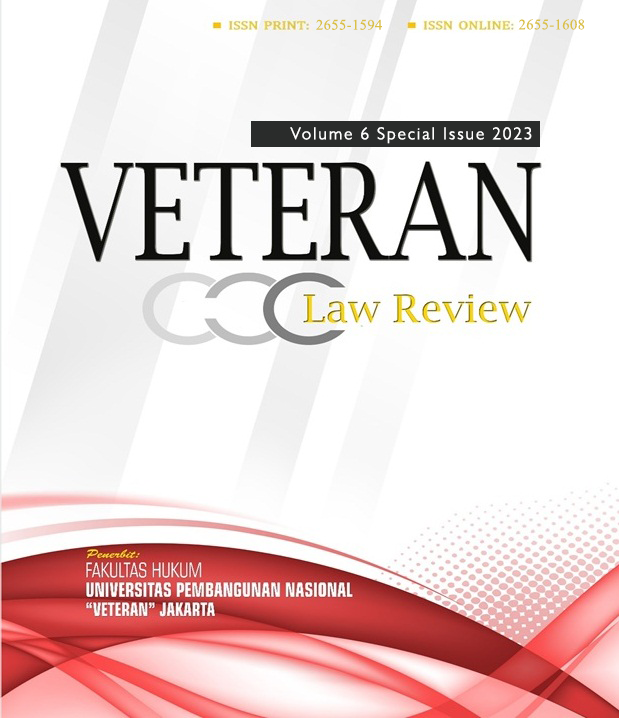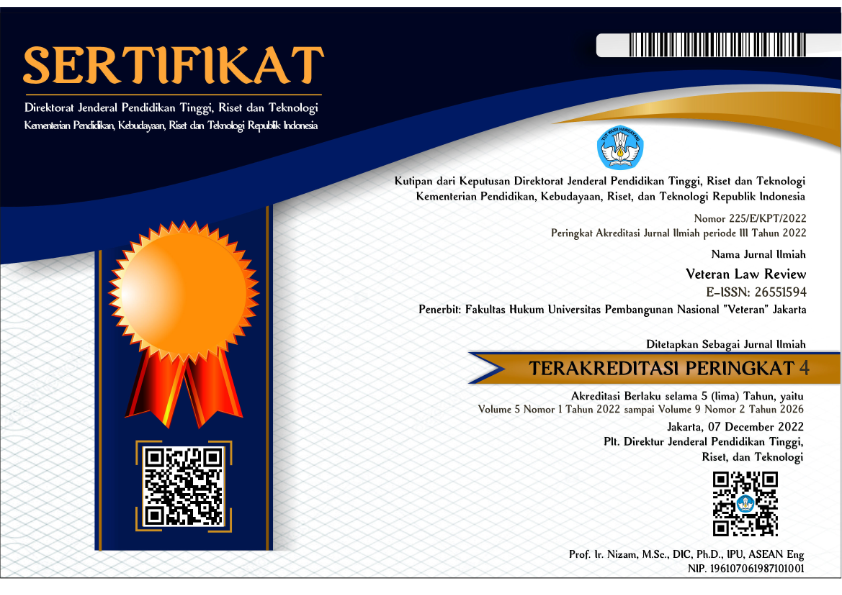Legal Sociology Approach: A Critical Study on Understanding the Law
DOI:
https://doi.org/10.35586/velrev.v6iSpecialIssues.4955Keywords:
Law, Sociology of Law, Positive Law, ApproachAbstract
The need for legal certainty as progress and change in societal life. This article seeks to provide a description of legal practices in society that emphasizes a legal sociology approach to comprehending the laws, whether they are appropriate, different from or even at odds with the laws in the law book, or unwritten laws that are accepted as legitimate by society. This change has continued since antiquity, modern times, and even this age of civility or globalization. There are many approaches and methods or approaches that can be used in building justice, including in the sociology of law approach. Studies related to the method approach have recently experienced a dynamic development along with the needs and demands of the community. Theoretical studies and empirical research seek to answer various problems about the effectiveness of the work of law in the entire institutional structure of law in society. This legal sociology approach expects to describes the state of society complete with interrelated social structures and symptoms. It is used because the normative goal of the law is to have a good balance in society, the process of law is in the society itself, thus it can be said that society is the source of law, and the law cannot be separated from the social environment. It emphasizes the study of the relationship between law thinking and its social base and does not see the law as an esoteric area. The study of legal sociology using various approaches may give a positive contribution in understanding and developing law products and build a guaranteed life in accordance with applicable laws and regulations as well as community compliance with the law.
Downloads
References
Alberto. (2018). Law, Legal Culture and Society: Mirrored Identities of the Legal Order. Law, Legal Culture and Society: Mirrored Identities of the Legal Order. https://doi.org/10.4324/9781351040341.
Anshori, Abdul Ghofur. (2006). Filsafat Hukum: sejarah, Aliran dan Pemaknaan. Yogyakarta: Gadjah Mada University Press.
Banakar, Reza. (2015). Normativity in Legal Sociology. Normativity in Legal Sociology. https://doi.org/10.1007/978-3-319-09650-6.
Black, Donald. (1976). The Behavior of Law. New York: Academic Press.
Domselaar, Iris van. (2022). Law’s Regret: On Moral Remainders. (in)Commensurability and a Virtue-Ethical Approach to Legal Decision-Making. Jurisprudence 13 (2). 220–39.https://doi.org/10.1080/20403313.2021.2014709.
Efendi, Yose Rizal, Ramlan Ramlan, and Ferry Susanto Limbong. (2021). Sustainability, Legal, Of Object, Gadai Execution, By A Porrietary, Assets That, Are Debt, Guaranteed Without, and Agreement. Veteran Law Review”. 40–53.
Febbrajo, Alberto. (2018). Law, Legal Culture and Society: Mirrored Identities of the Legal Order. Law, Legal Culture and Society: Mirrored Identities of the Legal Order. https://doi.org/10.4324/9781351040341.
Freeman, Michael D A. (2006). LAw and Psychology Current Legal Issues 2006. Current. Vol. 9.
Grey, Janet. (2016). Book Review - Understanding Construction Law. Construction Economics and Building 16 (4). 99–100. https://doi.org/10.5130/ajceb.v16i4.5289.
Hartati, Sintara, and Maryani. (2020). A Sociology of Jurisprudence. 2006. A Sociology of Jurisprudence. https://doi.org/10.5040/9781472563552: 74-88.
Hartati, Sri, Dani Sintara, and Halimatul Maryani. (2020). Utilization Of State Property By Partners In The Perspective Of Utilitarianism Legal Theory. Veteran Law Review 5 (1). 74–88.
Jaffey, Peter. (2017). Two Ways to Understand the Common Law. Jurisprudence. 8 (3): 435–60. https://doi.org/10.1080/20403313.2017.1361696.
Jurdi, Syarifuddin. (2006). Sosiologi Politik dan Hukum: Pendekatan Normatif, Teoritik dan Empiris. Jurnal Sosiologi Reflektif, UIN Kalijaga Yogyakarta. 1(1).
Kusumaatmadja, Mochtar. (1976). Hukum, Masyarakat, dan Pembinaan Hukum Nasional. Bandung: Penerbit Binacipta.
Kusumah, Mulyana W. (1986). Perspektif, Teori dan Kebijaksanaan Hukum. Jakarta: Rajawali.
Nasiri and Miftahul Ulum. (2019). The Concept Of Maslahah By Al-Imam Malik And Al-Imam Al-Tufi (Comparative Study OfMaslahah Al-ImamMalik and Al-Imam Najm Al-Din Al-Tufi). Veteran Law Review. 5 (1). 58–76.
Nasution, Dicky Kurniawan, and Ahmad Fauzi. n.d. the Land Act Maker Deli Serdang. Veteran Law Review. 120–29.
Ortynskyi, Volodymyr, Stepan Slyvka, Nadiya Scotna, Oksana Levytska, and Ivanna Shcherbai. (2021). Features of the Socio-Political and Theoretical Foundations of the Philosophical Understanding of Law from the Middle Ages to the Present. Wisdom, 19 (3). 204–16. https://doi.org/10.24234/WISDOM.V19I3.488.
Pavčnik, Marijan. (2017). Questioning the Moral Understanding of Law. The Philosophy of Law Far Precedes the Sociology of Law. 8 (2). 111–16. https://doi.org/10.1515/danb-2017-0008.
Přibáň, Jiří. (2017). A Sociology of Legal Distinctions: Introducing Contemporary Interpretations of Classic Socio-Legal Concepts. Journal of Law and Society. 44 (October). S1–18. https://doi.org/10.1111/jols.12046.
Rahardjo, Satjipto. (1986). Hukum dan Masyarakat. Bandung: Angkasa.
------------. (2004), Hukum Progresif untuk Pemilu Presiden, dalam Artikel Harian Kompas, Tanggal, 20 September 2004.
------------. (1977), Pemanfaatan Ilmu-ilmu Sosial bagi Pengembangan Ilmu Hukum, Bandung: Alumni.
------------. (2002). Sosiologi Hukum Perkembangan Metode dan Pilihan Masalah, Surakarta. Muhammayah University Press.
Rohayu, Rina, and - Absori. (2019). Utilizing the Values of Local Wisdom. International Journal of Social Sciences and Humanities. 3 (1). 91–101. https://doi.org/10.29332/ijssh.v3n1.263.
Sihombing, RiEka N.A.M, Cynthia Hadita, and Muhammad Yusrizal Adi Syaputra. (2019). Legal Securities Against Covid-19 Patient Privacy Data in Indonesia. Veteran Law Review Consumer Rights in Indonesia. 275–82.
Soekanto, Soerdjono. (1989). Kegunaan Sosiologi Hukum bagi Kalangan Hukum. Bandung: Citra Aditya Bakti.
Sustainability, Legal, of Object, Gadai Execution, By A Porrietary, Assets That, Are Debt, Guaranteed Without, and Agreement Of. 1974. Veteran Law Review. 7. 40–53.
Thornhill, Chris. (2016). A Sociology of Transmitional Constituions: Social Foundations of the Post-National Legal Structure. the University of Cambridge: Cambridge University Press. https://doi.org/DOI 10.1017/CBO9781139833905.: 1-505
Ulum, M. (2019). Protection, Legal, For Victims, and Of Criminal. Veteran Law Review. 58-76
Unger, Roberto Mangebeira. (1976). Law and Modern Society, Toward a Criticism of Social Theory. New York: The Free Pres.
------ (2006). A Sociology of Jurisprudence. A Sociology of Jurisprudence. https://doi.org/10.5040/9781472563552.
Wahyudi, Slamet Tri, Syamsul Hadi, and Aji Lukman Ibrahim. (2020). Veteran Law Review. 5 (1): 74–88.
Wignjosoebroto, Soetandyo. (2008). Hukum dalam Masyarakat Perkembangan dan Masalah Sosial sebuah Pengantar kearah kajian Sosiologi Hukum. Malang: Penerbit Bayumedia.
Williams, George M. (2017). Modes of Understanding the Law. Law and Literature. 29 (1). 157–66. https://doi.org/10.1080/1535685X.2016.1246920.
Downloads
Published
How to Cite
Issue
Section
License
Copyright (c) 2023 Veteran Law Review

This work is licensed under a Creative Commons Attribution-ShareAlike 4.0 International License.
Copyright (c) 2022 Veteran Law Review Journal
Veteran Law Review © 2022 by Faculty of Law Universitas Pembangunan Nasional "Veteran" Jakarta is licensed under Creative Commons Attribution 4.0 International

1. License
The non-commercial use of the article will be governed by the Creative Commons Attribution license as currently displayed on Creative Commons Attribution 4.0 International.
2. Author(s)' Warranties
The author warrants that the article is original, written by the stated author(s), has not been published before, contains no unlawful statements, does not infringe the rights of others, is subject to copyright that is vested exclusively in the author, and free of any third party rights, and that any necessary written permissions to quote from other sources have been obtained by the author(s).
3. User/Public Rights
VELREV's spirit is to disseminate articles published are as free as possible. Under the Creative Commons Attribution-ShareAlike 4.0 International License. VELREV permits users to copy, distribute, display, and perform the work for non-commercial purposes only. Users will also need to attribute authors and VELREV to distributing works in the journal and other media of publications.
4. Rights of Authors
Authors retain all their rights to the published works, such as (but not limited to) the following rights;
- Reproduce the work
- Prepare derivative works based upon the work
- Distribute copies of the work
- Perform the work publicly
- Display the work publicly
- Copyright and other proprietary rights relating to the article, such as patent rights,
- The right to self-archive the article,
- The right to enter into separate, additional contractual arrangements for the non-exclusive distribution of the article's published version (e.g., post it to an institutional repository or publish it in a book), with an acknowledgement of its initial publication in this journal (Veteran Law Review).
5. Co-Authorship
If the article was jointly prepared by more than one author, any author submitting the manuscript warrants that he/she has been authorized by all co-authors to be agreed on this copyright and license notice (agreement) on their behalf, and agrees to inform his/her co-authors of the terms of this policy. VELREV will not be held liable for anything that may arise due to the author's internal dispute. VELREV will only communicate with the corresponding author.
6. Royalties
Being an open accessed journal and disseminating articles for free under the Creative Commons license term mentioned, author(s) are aware that VELREV entitles the author(s) to no royalties or other fees.
7. Miscellaneous
VELREV will publish the article (or have it published) in the journal if the article’s editorial process is successfully completed. JOSI's editors may modify the article to a style of punctuation, spelling, capitalization, referencing, and usage that deems appropriate. The author acknowledges that the article may be published so that it will be publicly accessible and such access will be free of charge for the readers as mentioned in point 3.


















